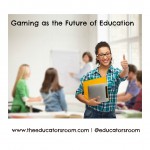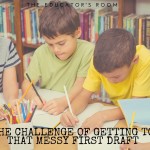In Part 1 and Part 2 of this series, I discussed the bigger picture of gaming in our students’ and children’s lives and how gaming can connect to education. In this article, I discuss how gaming has affected my own son’s education.
I’ve written previously about how my son began unschooling a year ago. As a fairly traditional teacher at the time, it was a much bigger adjustment for me than it was for him. He’d already experienced so many difficult schooling experiences, that he moved quite smoothly through a period of what is generally called “de-schooling” right into his independent learning. He is turning 12 years old and finishing his second year of unschooling. He spends part-time at home and part time at a democratic school. I have felt very thankful every day for the ability to create an individual education pathway for my son. The person most changed by the process, however, has been me. I was very nervous for my son to leave the familiar world of tradition education, which I love and in which I truly believe. But just as it didn’t fit him, I quickly learned as he explored his own interests that it didn’t fit a lot of my students either. As my son let go of traditional education, I radically changed the way I taught my students, moving to student-choice based curriculum, looking for project based assessments, and engaging my students in exploring their own interests within the subjects I taught.
how my son began unschooling a year ago. As a fairly traditional teacher at the time, it was a much bigger adjustment for me than it was for him. He’d already experienced so many difficult schooling experiences, that he moved quite smoothly through a period of what is generally called “de-schooling” right into his independent learning. He is turning 12 years old and finishing his second year of unschooling. He spends part-time at home and part time at a democratic school. I have felt very thankful every day for the ability to create an individual education pathway for my son. The person most changed by the process, however, has been me. I was very nervous for my son to leave the familiar world of tradition education, which I love and in which I truly believe. But just as it didn’t fit him, I quickly learned as he explored his own interests that it didn’t fit a lot of my students either. As my son let go of traditional education, I radically changed the way I taught my students, moving to student-choice based curriculum, looking for project based assessments, and engaging my students in exploring their own interests within the subjects I taught.
As I reached to find new ways to engage my own students, I struggled to find the same for my son. I began to notice that his gaming life engaged him FAR more than any assignment I could give him, no matter how creative I got. At first, I saw gaming as probably a lot of parents and teachers do: it was the enemy of learning. I assumed it was distracting my son, creating a boy who would not pay attention, drawing him away from true learning. I worried and fretted that gaming would ruin his unschooling experiment because he would lose interest in learning. I soon realized that I wasn’t following the advice I often gave my students: education removes fear and uncertainty. So I started to educate myself about gaming. And I began to realize that my fears were misplaced.
As game designer and researcher Dr. Jane McGonigal says in her book, Reality is Broken: Why Games Make us Better and How they Can Change the World:
Game design isn’t just a technological craft. It’s a twenty-first-century way of thinking and leading. And gameplay isn’t just a pastime. It’s a twenty-first-century way of working together to accomplish real change.
Gaming is not the enemy of learning. In fact, purposeful play (as discussed in Part 1 of this series) can be a vibrant learning tool if appreciated and used well. As I learned more about gaming, gamification, and my own son’s gaming habits, I realized that there was no reason why his engagement with the games he enjoys shouldn’t be equal to his engagement with subject matter important to his intellectual and social growth.
Here are a few examples of how gaming has become the basis of learning for my son. Last week we used Teach with Portals to do two geometry lessons and a lesson on abstract thinking and story crafting. If you haven’t seen it, the Teach with Portals site is a collection of lesson plans created by teachers using the video game Portal. It is one of the single most creative games to come out in the last decade. The game itself is a series of physics challenges – the gamer has to figure out how to use physics to escape a lab that is doing “science” experiments. The story, the setting, and the tools are all simple but intensely engaging as the gamer works to calculate how to use physics to escape. The lessons created by teachers from around the country are for all different subject areas. Last week we chose one that challenged my son to build a Portal room that contained items that completed his list of geometry terms. Then he showed me his creation and in explaining the various items, demonstrated his understanding of the terms. Math vocabulary in a game!
Another lesson had students build a Rube Goldberg machine in a Portal Room. The assignment was to make as many steps as possible for the player to have to go through in order to get out of the room. My son, already a fan of Rube Goldberg machines, worked hard to create what turned out to be a tremendously intricate series of mechanisms. It led us into a fantastic conversation about the idea of efficiency and when it is a positive thing and when it might not be. We also talked about setting and mood, and why those might help someone understand a story better or relate more to the characters. The applications are endless when students can use something they relate to – a game they love – to understand concepts in academic subjects.
One of our newer science challenges was to explore the new NASA Space Apps Challenge, designed by gamemakers, scientists and engineers to engage gamers around the world to collaborate in solving a myriad of challenges in space exploration, such as asteroid prospecting. Many games like this, which involve the gamers in actual scientific discovery and work, can be found at The Science Game Center. Because of this exploration, my son sparked an interest in robotics and is now learning how to build a robot with his dad. Every kid is different, and you can never tell what new interest will ignite through a favorite game or the exploration of a new game.
We also use Chore Wars at home – a fantastic way to join gaming with real life. Chore Wars allows the users to set up a “party” similar to the World of Warcraft model, where every one role-plays as a character on an adventure. Each adventure is created by the Game Master (similar to Dungeons and Dragons), and corresponds to a real life job, chore or goal. Families, classrooms, and even business offices have been using Chore Wars for years to organize the chores necessary to manage their daily environment. Our Chore Wars adventures not only include household chores, but also projects and learning experiences connected to my son’s independent schoolwork. Our XP (experience points) add up to a variety of real world rewards that we both decided upon. We enjoy challenging each other when one is falling behind in points or has not managed to pick up extra loot like a golden scepter or diamond crown in the process of completing an adventure.
We also just simply game together regularly, almost every evening (or during the day on weekends). We love tabletop gaming and have made it a habit the last few years to learn at least 3-4 new games each year. During our gaming time, we enjoy rich conversations, mom and son, with an activity between us to soften any topic we might discuss. We have learned about the differences between European style games (like Settlers of Catan, Dixit, Castle Panic, or Ticket to Ride), which focus on strategy and often require collaboration, and American style games (like Monopoly, Sorry!, or Battleship), which more often focus on luck and elimination of players. To understand gaming and my son’s love for it even more, I finally took the plunge and asked him to teach me to play some of his video games (the last time I was good at a video game was the summer of 1984 when I was Q-bert champion at the arcade for a day). I have tried my hand at Minecraft, Battleblock Theater (in which he created his own levels and challenges), and Lego Marvel Superheroes. Just being able to teach me opened him up to new ideas and ways to learn.
What I most love to play, however, are the games my son creates himself. He has created board games that we’ve played together. And he’s used the fantastic free tool GameMaker to create video games of his own. With GamMaker, he can create “old fashioned” 8-bit games with the unique characters and levels that he designs. Because he was able to explore his creative side and challenge himself to create games that required skill and strategy, he realized he wanted to learn more. He is now learning computer languages so that he can begin programming, starting with Basic, and now Perl. He learns with a friend, and they partner together, creating simple programs that are usually in game form. In fact, his first program using Perl was a form of Mad Libs.
My son loves gaming. And I have learned that his love for gaming is not the enemy of his learning; it can lead him to learn rich and meaningful things in rich and meaningful ways – if I am also willing to engage with his gaming life. He is learning math, how to write stories, how to collaborate with teammates, and even new languages. The music from his games has inspired him to take up guitar.
Kids know what engages them and what inspires them to learn. Whether we have the ability and capacity to adjust to the vibrancy of the gaming world and all it can offer is our challenge as educators and parents. American kids are not going to stop gaming. The fact that 92% of two-year-olds have played digital games tells us that our students are already straddling two worlds: their gaming world and their education world. So how can we use the lessons of that gaming world to make their education world just as engaging? It is time for us to figure that out.





